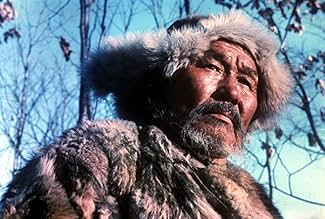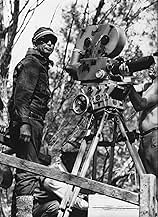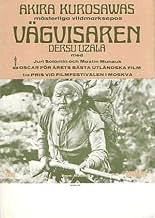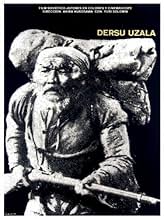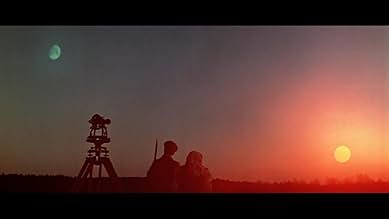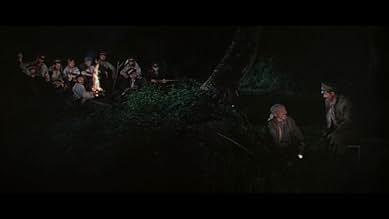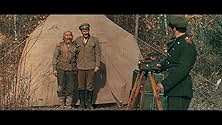VALUTAZIONE IMDb
8,2/10
35.433
LA TUA VALUTAZIONE
L'esercito russo invia un esploratore in spedizione nella nevosa e selvaggia steppa siberiana, dove egli diventa amico di un esperto cacciatore locale.L'esercito russo invia un esploratore in spedizione nella nevosa e selvaggia steppa siberiana, dove egli diventa amico di un esperto cacciatore locale.L'esercito russo invia un esploratore in spedizione nella nevosa e selvaggia steppa siberiana, dove egli diventa amico di un esperto cacciatore locale.
- Regia
- Sceneggiatura
- Star
- Vincitore di 1 Oscar
- 8 vittorie e 1 candidatura in totale
Mikhail Bychkov
- Otryad Arseneva
- (as M. Bychkov)
Vladimir Khrulyov
- Otryad Arseneva
- (as V. Khrulyov)
Stanislav Marin
- Otryad Arseneva
- (as S. Marin)
Igor Sykhra
- Otryad Arseneva
- (as I. Sykhra)
Vladimir Sergiyakov
- Otryad Arseneva
- (as V. Sergiyakov)
Yanis Yakobsons
- Otryad Arseneva
- (as Ya. Yakobsons)
Vladimir Khlestov
- Otryad Arseneva
- (as V. Khlestov)
Vladimir Sverba
- Otryad Arseneva
- (as V. Sverba)
Vladimir Kremena
- Turtygin
- (as V. Kremena)
Aleksandr Pyatkov
- Olenev
- (as A. Pyatkov)
Recensioni in evidenza
This 1975 joint Japanese-Russian film is a celebration of simple virtues, friendship, loyalty, love, and respect for nature. Based on the journals of the Tsarist explorer and surveyor, Captain Vladimir Arseniev, it is the story of the relationship between Captain Arseniev and an Asiatic hunter of the Goldi tribe named Dersu Uzala. With a love and understanding of the forest that is extraordinary, Dersu guides the Captain through several deadly encounters. He saves the Captain's life by building a shelter out of reeds during a ferocious wind storm. Maksim's performance as Dersu, the ancient woodsman, is very "Yoda-like": wonderous, dignified, and very natural.
The friendship between the two main characters grows over many years and several expeditions in the wild. Their relationship is beautifully developed and moves to an inevitable climax when Dersu and the Captain move back to the Captain's home in the city.
There is in this film a sense of the beauty, tranquility, and timelessness of nature. It takes place at a time in the early part of the last century when people had closer ties with nature and felt a kinship with animals, plants, and the elements. Dersu endearingly refers to all elements of nature including the river, the wind, the trees, and the animals as "men". As the English writer, Hugh Trevor-Roper said of Shakespeare so it is true of Dersu, "He sees mankind almost as part of nature, sometimes basking in a delightful, smiling Nature; sometimes caught up in a fierce, cruel, inexorable, insatiable Nature".
I was totally absorbed in this film and in its regard for the essential goodness of man and the beauty of the natural world. Dersu Uzala is a great film from one of the all-time masters.
The friendship between the two main characters grows over many years and several expeditions in the wild. Their relationship is beautifully developed and moves to an inevitable climax when Dersu and the Captain move back to the Captain's home in the city.
There is in this film a sense of the beauty, tranquility, and timelessness of nature. It takes place at a time in the early part of the last century when people had closer ties with nature and felt a kinship with animals, plants, and the elements. Dersu endearingly refers to all elements of nature including the river, the wind, the trees, and the animals as "men". As the English writer, Hugh Trevor-Roper said of Shakespeare so it is true of Dersu, "He sees mankind almost as part of nature, sometimes basking in a delightful, smiling Nature; sometimes caught up in a fierce, cruel, inexorable, insatiable Nature".
I was totally absorbed in this film and in its regard for the essential goodness of man and the beauty of the natural world. Dersu Uzala is a great film from one of the all-time masters.
I own many of Akira Kurosawa's films. I have Ran, Throne of blood, Seven Samarai, Roshomon, Dreams, Hidden Fortress, Jojimbo, Snajuro, Red Beard, and even "Kurosawa" the documentary. I guess you can say that I like his work. The "Kurosawa" documentary narrated by Sam Shepard and produced by thirteen / WNET I recommend for anyone at all interested in Kurosawa's films as it will really wet your appetite.
Of all of his films, Dersu Uzala is my favorite. It is also one of my favorite films by anybody. It was done shortly after Akira had went through a very dark time in his life and had attempted suicide. It was his first film afterwards and the content of the film appears to reflect more than a little of his mindset at the time. Dersu Uazla is both a feel good film and also a sad film. It touches the way that people as they grow older have a more and more difficult time adapting to life as it changes and has its affect on them. The end of the film can certainly show light on the inhumanity that appears to be growing more prevalent in our society. But, I think what you remember from the film is the love between two individuals, and that is what feels good.
Many of Kurosawa's films have a great deal of spectacle, and he is perhaps known best for his Samarai films. There is none of that in this movie. Dersu Uzala is a statement by Akira of life. Akira was fighting to keep making films and was not having an easy time of it. If Akira Kurosawa could not make films, he could not feel that he was living. As a result, he attempted suicide. He survived to make this film plus many others that we all enjoy today. Dersu Uzala may be the most important of his films and the one that shows the great director's true personality. Just perhaps, it shows more about humanity than any of his other films. Again, it is my favorite.
Of all of his films, Dersu Uzala is my favorite. It is also one of my favorite films by anybody. It was done shortly after Akira had went through a very dark time in his life and had attempted suicide. It was his first film afterwards and the content of the film appears to reflect more than a little of his mindset at the time. Dersu Uazla is both a feel good film and also a sad film. It touches the way that people as they grow older have a more and more difficult time adapting to life as it changes and has its affect on them. The end of the film can certainly show light on the inhumanity that appears to be growing more prevalent in our society. But, I think what you remember from the film is the love between two individuals, and that is what feels good.
Many of Kurosawa's films have a great deal of spectacle, and he is perhaps known best for his Samarai films. There is none of that in this movie. Dersu Uzala is a statement by Akira of life. Akira was fighting to keep making films and was not having an easy time of it. If Akira Kurosawa could not make films, he could not feel that he was living. As a result, he attempted suicide. He survived to make this film plus many others that we all enjoy today. Dersu Uzala may be the most important of his films and the one that shows the great director's true personality. Just perhaps, it shows more about humanity than any of his other films. Again, it is my favorite.
In 1902, a Russian army expedition is assigned to explore Siberia under the command of Captain Vladimir Arseniev (Yuri Solomin). He befriends the Goldi (Nanai) hunter Dersu Uzala (Maksim Munzuk) and invites him to guide the explorers through the stark forest up to Khanka Lake. Along their journey, Arseniev discovers that Dersu Uzala is a man with a beautiful soul and they become close friends. When his assignment ends, Dersu Uzala says goodbye to Arseniev. In 1907, Captain Arseniev is assigned for another expedition to the Ussuri River; when he meets Dersu Uzala in the forest, the lonely hunter joins his team and guides the group. However, he is older and has problems with his vision and Captain Arseniev invites Dersu Uzala to live with his family in Khabarovsk City. But the old man does not adapt to the urban lifestyle and decides to return to the forest. In 1910, Captain Arseniev is called to Korfovskaïa to identify the body of a man that has his calling card and might be Dersu Uzala.
"Derzu Uzala" is a simple and unforgettable tale of friendship between a Russian Captain and a lonely hunter with a beautiful soul. This wonderful movie has one of the most beautiful cinematographies I have ever seen and the camera work is impressive, with awesome angle and locations that seems to be of pictures in movement. I had watched most of Akira Kurosawa movies and I do not know how I could forget to see this magnificent must-see movie of his amazing cinematography. My vote is nine.
Title (Brazil): "Dersu Uzala"
"Derzu Uzala" is a simple and unforgettable tale of friendship between a Russian Captain and a lonely hunter with a beautiful soul. This wonderful movie has one of the most beautiful cinematographies I have ever seen and the camera work is impressive, with awesome angle and locations that seems to be of pictures in movement. I had watched most of Akira Kurosawa movies and I do not know how I could forget to see this magnificent must-see movie of his amazing cinematography. My vote is nine.
Title (Brazil): "Dersu Uzala"
10hartj-1
A wonderful film. It showcases the natural beauty of the Taiga and presents a contrast between the technological and the pastoral. Dersu is one with the forest. He knows its ways and its moods. The Russians scoff at his ways and his 'primitive' belief system, but eventually come to rely on him, and even love him. It is a beautiful story that takes place in an world that very few of us in the West have had a chance to see. I thought the fact that the film was set in the pre-revolutionary period gave it a peculiar sort of charm - Russia before the Great War and the Russian Revolution was innocent and even naive, the same way the Russian soldiers were innocent of the wonders and the dangers of the Taiga. One of the things I loved most about this film was the cinematography - there are long, lingering shots of the landscape, the endless steppe, the forest, the rivers, the mountains. We believe ourselves to be powerful because we have been moderately successful in our attempts to harness nature for our own uses, but the film shows us that we are deluding ourselves, that nature cannot be controlled or resisted, and the truly powerful are those, like Dersu, who co-exist in harmony with nature and learn what the wilderness teaches.
Akira Kurosawa was a masterful director and powerful storyteller, Dersu has always been my favourite of his films. It was also the first I saw - on Christmas Day afternoon 1978 on UK BBC2 - would that they were as adventurous nowadays! Since then of course I've seen all of his films from Stray Dog on, Rashomon and Ran being especial favourites, but I keep on coming back to watch this one, ostensibly the simplest tale Kurosawa ever filmed.
The understanding and bonding that develops between the two men Arseniev and Dersu is wonderful to see, and over two hours holds your attention with expertly observed minutiae of character and scenic interplay. The last ten minutes cover a lot of ground (no pun intended) but it's all so logical and sad that I always need to see the end credits to recover.
So many marvellous scenes: the tiger in the forest in the morning; the phlegmatic reclusive old Chinaman; the raft; wispy blue shaded smoke from night-fires; the conclusion of course; the view of those two great men, the Moon and the Sun in the same shot. Not everyone would like Dersu, their most likely comments being "boring" - but how wrong they are they'll never know!
A film not fit to lick Dersu Uzala's metaphorical boots (or even Plan 9 from Outer Space's for that matter), Blazing Saddles was filmed the same year in America and a generation on still gets more praise than this poetic masterpiece!
The understanding and bonding that develops between the two men Arseniev and Dersu is wonderful to see, and over two hours holds your attention with expertly observed minutiae of character and scenic interplay. The last ten minutes cover a lot of ground (no pun intended) but it's all so logical and sad that I always need to see the end credits to recover.
So many marvellous scenes: the tiger in the forest in the morning; the phlegmatic reclusive old Chinaman; the raft; wispy blue shaded smoke from night-fires; the conclusion of course; the view of those two great men, the Moon and the Sun in the same shot. Not everyone would like Dersu, their most likely comments being "boring" - but how wrong they are they'll never know!
A film not fit to lick Dersu Uzala's metaphorical boots (or even Plan 9 from Outer Space's for that matter), Blazing Saddles was filmed the same year in America and a generation on still gets more praise than this poetic masterpiece!
Lo sapevi?
- QuizAkira Kurosawa had hoped to make this film as early as in the 1950s, but he had trouble adapting the story to a Japanese setting, never thinking that one day he would actually be able to film it on location in Russia, and with Russian actors.
- BlooperWhen Dersu and Arsenev are looking at the 3/4 moon and the setting sun, the moon is in the wrong phase to appear in the sky at the same time as the sun.
- Citazioni
Dersu Uzala: How can people live in a box?
- ConnessioniFeatured in For the Love of Movies: The Story of American Film Criticism (2009)
I più visti
Accedi per valutare e creare un elenco di titoli salvati per ottenere consigli personalizzati
- How long is Dersu Uzala?Powered by Alexa
Dettagli
- Data di uscita
- Paesi di origine
- Sito ufficiale
- Lingue
- Celebre anche come
- Dersu Uzala
- Luoghi delle riprese
- Aziende produttrici
- Vedi altri crediti dell’azienda su IMDbPro
Botteghino
- Budget
- 4.000.000 USD (previsto)
- Lordo in tutto il mondo
- 14.480 USD
- Tempo di esecuzione
- 2h 14min(134 min)
- Colore
- Proporzioni
- 2.20 : 1
Contribuisci a questa pagina
Suggerisci una modifica o aggiungi i contenuti mancanti


